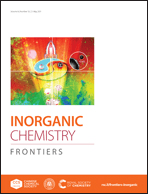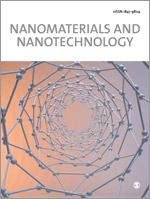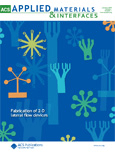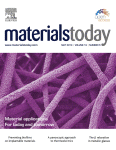
Small Science
Scope & Guideline
Bridging Disciplines Through Open Access Research
Introduction
Aims and Scopes
- Nanomaterials and Nanotechnology:
Research on the synthesis, characterization, and application of nanomaterials, including metal-organic frameworks, nanoparticles, and nanocomposites, aimed at enhancing performance in fields such as energy storage, catalysis, and biomedical applications. - Biomaterials and Tissue Engineering:
Investigation of novel biomaterials for applications in regenerative medicine, including tissue engineering, drug delivery systems, and smart biosensors, focusing on their interactions at the nanoscale. - Electrocatalysis and Energy Conversion:
Studies on electrocatalytic processes and energy conversion technologies, including the development of advanced catalysts for hydrogen evolution, CO2 reduction, and battery technologies. - Environmental Applications:
Exploration of nanotechnology for environmental remediation, including wastewater treatment and pollutant detection, emphasizing the design of materials that can effectively interact with and remove contaminants. - Photonic and Electronic Devices:
Research on the integration of nanomaterials into photonic and electronic devices, focusing on their potential for improving performance in applications such as sensors, transistors, and solar cells. - Computational and Theoretical Studies:
Utilization of computational methods to model and predict the behavior of nanomaterials, providing insights into their properties and guiding experimental designs.
Trending and Emerging
- Smart Nanomaterials:
An increasing number of studies are focusing on the development of smart nanomaterials that respond to environmental stimuli, such as temperature or pH, for applications in drug delivery and biosensing. - Sustainable and Green Technologies:
There is a growing trend towards sustainable practices within nanotechnology, including the use of waste-derived materials and environmentally friendly synthesis methods for nanomaterials. - Integration of AI and Machine Learning:
Research utilizing artificial intelligence and machine learning for the design, optimization, and predictive modeling of nanomaterials is gaining traction, reflecting the interdisciplinary nature of modern scientific research. - Nanotechnology in Healthcare:
Emerging applications of nanotechnology in healthcare, particularly in targeted drug delivery, diagnostic imaging, and cancer therapy, are increasingly prominent, highlighting the potential of nanoscale innovations to transform medical treatments. - Energy Harvesting and Storage:
Innovations in nanotechnology for energy harvesting and storage solutions, such as advanced batteries and supercapacitors, are on the rise, demonstrating the need for efficient energy solutions in a sustainable future.
Declining or Waning
- Traditional Bulk Materials:
Research focusing on conventional bulk materials has decreased as the field moves towards more innovative nanostructured materials and their unique properties. - Inorganic Photovoltaics:
There has been a waning interest in traditional inorganic photovoltaic technologies, as research increasingly emphasizes organic and hybrid solar cells that leverage nanotechnology for enhanced efficiency. - Basic Material Characterization:
Papers centered solely on fundamental characterization of materials without application-oriented insights are appearing less frequently, as the journal shifts towards studies that demonstrate practical applications of nanomaterials. - Static Applications of Nanotechnology:
Research that explores static or non-dynamic applications of nanotechnology is declining, with a stronger emphasis now on dynamic systems such as responsive and adaptive materials.
Similar Journals

ChemNanoMat
Fostering Collaboration in Cutting-Edge ResearchChemNanoMat is a prestigious academic journal published by WILEY-V C H VERLAG GMBH, dedicated to the rapidly evolving fields of nanoscale materials and their applications in diverse areas such as biomaterials, energy engineering, and environmental sustainability. With the journal's ISSN 2199-692X and recognized quality, as evidenced by its Q2 rankings across multiple categories—including Biomaterials and Renewable Energy—ChemNanoMat serves as a crucial platform for researchers, professionals, and students to disseminate their findings and foster collaborations. Operating from Germany, the journal encourages the exploration of innovative materials solutions to meet tomorrow's challenges. While it does not currently offer open access options, it remains highly regarded in the academic community with a competitive impact factor that emphasizes its relevance and influence in guiding future research directions. Covering a broad scope from 2015 through 2024, ChemNanoMat is key for anyone invested in the advancement of materials chemistry and related scientific fields.

ACS Materials Letters
Advancing the Frontiers of Materials Science and EngineeringACS Materials Letters is an esteemed peer-reviewed journal published by the American Chemical Society, emphasizing groundbreaking research and advancements in the fields of materials science, biomedical engineering, and chemical engineering. With a robust update and established reputation since its inception in 2019, this journal has rapidly ascended to the top tiers, achieving Q1 rankings in key categories such as Biomedical Engineering, Chemical Engineering (miscellaneous), and Materials Science (miscellaneous) in 2023. The journal boasts impressive Scopus rankings, including #14 in General Chemical Engineering and #19 in Biomedical Engineering, placing it among the elite publications in these domains. While not fully open access, ACS Materials Letters facilitates the dissemination of high-impact research accessible to academics and industry professionals alike. With its comprehensive scope and rigorous selection process, the journal serves as a vital resource for researchers and students eager to stay abreast of the latest innovations and technologies shaping materials science and engineering.

Frontiers of Materials Science
Fostering Collaboration for Tomorrow's Material SolutionsFrontiers of Materials Science is a groundbreaking journal dedicated to exploring advanced materials and their applications within the ever-evolving landscape of materials science. Published by HIGHER EDUCATION PRESS, this journal offers a crucial platform for scholars and practitioners seeking to disseminate innovative research findings that foster interdisciplinary collaboration. Since its inception in 2011, the journal has enjoyed a notable Q2 ranking in the category of Materials Science (miscellaneous) as of 2023, positioning it among the noteworthy publications in the field with a Scopus rank of #222 out of 463. While predominantly published in China, the journal is committed to open access principles, allowing global accessibility to cutting-edge research. With its comprehensive coverage spanning materials synthesis, characterization, properties, and applications, Frontiers of Materials Science not only serves as a repository for academia but also bridges the gap between research and industry, making it an indispensable resource for researchers, professionals, and students alike.

Materials Chemistry Frontiers
Bridging Science and Innovation in Materials ChemistryMaterials Chemistry Frontiers, published by the esteemed Royal Society of Chemistry, stands as a leading journal in the realm of materials science and chemistry, with an impressive Q1 ranking in both Materials Chemistry and Materials Science categories as of 2023. This open-access journal, operating from the United Kingdom, offers a platform for researchers, professionals, and students to disseminate high-quality, impactful research. With its E-ISSN 2052-1537, the journal is dedicated to publishing cutting-edge articles, reviews, and research communications that explore innovative materials and their applications, fostering a comprehensive understanding of the complex interplay between materials and their chemical properties. With consistent rankings in the Scopus metrics, being positioned at the 25th percentile among 317 in the Materials Chemistry category, it highlights its pivotal role in advancing the field. The journal thrives on contributions that broaden the scope of knowledge from 2017 to 2024 and beyond, solidifying its status as an essential resource for contemporary research in materials science.

Inorganic Chemistry Frontiers
Catalyzing Knowledge in Inorganic ChemistryInorganic Chemistry Frontiers, published by the esteemed Royal Society of Chemistry, stands at the forefront of advancements in the field of inorganic chemistry, boasting a prestigious Q1 ranking in its category as of 2023 and an impressive Scopus Rank of #3 out of 79, placing it in the 96th percentile. Since its inception in 2014, this journal has provided a robust platform for high-quality research that spans the diverse and rapidly evolving areas of inorganic chemistry. As an open-access journal, it ensures that the findings presented are readily accessible to researchers, educators, and practitioners globally, fostering an inclusive environment for the dissemination of knowledge. With its rigorous peer-review process, Inorganic Chemistry Frontiers aims to facilitate interdisciplinary dialogue and innovation, making it an essential resource for anyone dedicated to exploring the myriad applications and theoretical advancements within inorganic chemistry.

Nanomaterials and Nanotechnology
Unveiling the Potential of Nanoscale ApplicationsNanomaterials and Nanotechnology is a premier journal published by HINDAWI LTD, dedicated to advancing knowledge in the rapidly evolving fields of nanomaterials and nanoscale applications. Established as an Open Access platform since 2011, the journal aims to disseminate high-quality research that provides insights into nanotechnology's manifold aspects, including biotechnology, ceramics and composites, as well as electrical and electronic engineering. With a compelling impact factor reflected in its robust Scopus rankings—placing it in the 80th percentile in Engineering and the 72nd percentile in Biotechnology—it stands as a key resource for researchers, professionals, and students seeking to stay at the forefront of innovation in materials science. The journal occupies a distinguished position in the academic community, featuring studies that explore the synthesis, characterization, and application of nanomaterials, thereby contributing significantly to scientific discourse and technological advancement in this critical area.

Energy & Environmental Materials
Empowering a Greener Future with Innovative DiscoveriesEnergy & Environmental Materials, published by WILEY, is an esteemed academic journal dedicated to pioneering research in the multifaceted domains of energy, environmental science, and materials science. Since its inception in 2018, this journal has rapidly established itself as a leading platform, holding a prestigious Q1 ranking across multiple categories including Renewable Energy, Sustainability, and Waste Management, reflecting its significant contributions to advancing knowledge in these critical areas. With a robust Scopus ranking that positions it in the top percentile for Environmental Science and Materials Science, it caters to a diverse audience of researchers, professionals, and students seeking cutting-edge findings and practical applications in energy efficiency and sustainable materials. This open-access journal facilitates the dissemination of innovative research and aims to bridge the gap between scientific exploration and real-world solutions for a sustainable future. The editorial team encourages submissions that explore both theoretical and practical aspects, ensuring that every publication not only contributes to the academic landscape but also drives impactful change in energy and environmental practices.

ACS Applied Materials & Interfaces
Driving Discoveries at the Intersection of Science and ApplicationACS Applied Materials & Interfaces, published by the American Chemical Society, stands as a leading journal in the field of applied materials, nanotechnology, and interdisciplinary research in medicine. With an impressive Impact Factor that places it in the Q1 category across Materials Science, Medicine, and Nanoscience and Nanotechnology, this journal consistently ranks among the top tier, evidencing its significance and influence in advancing scientific knowledge. The journal’s scopus ranking of 33 out of 463 in General Materials Science further underscores its critical role in disseminating innovative and high-quality research. Although it is not an open-access journal, a diverse range of access options is available, ensuring that vital research findings are accessible to a broad audience of researchers, professionals, and students. Targeting breakthroughs in the synthesis, characterization, and application of materials and interfaces, ACS Applied Materials & Interfaces serves as a pivotal platform for publishing cutting-edge studies essential for future technological advancements.

TRANSACTIONS OF TIANJIN UNIVERSITY
Advancing multidisciplinary research for a global audience.TRANSACTIONS OF TIANJIN UNIVERSITY, published by SpringerNature, is a premier journal in the field of multidisciplinary research, boasting an impressive Q1 ranking and placing within the top 93rd percentile of its category according to Scopus. With an ISSN of 1006-4982 and E-ISSN of 1995-8196, this journal facilitates insightful and innovative contributions that span various disciplines, making it a vital resource for academics and professionals alike. Established in 2004, the journal continues to thrive with a commitment to advancing knowledge and fostering collaboration in scientific inquiry. TRANSACTIONS OF TIANJIN UNIVERSITY aligns with global research trends and offers a platform for the dissemination of high-quality research findings, promoting interdisciplinary approaches to solving complex problems. Located in China, its influence extends well beyond national borders, appealing to a diverse readership eager to explore the latest advancements and discussions in the multidisciplinary arena.

Materials Today
Connecting Researchers with Cutting-Edge DiscoveriesMaterials Today is a premier academic journal published by Elsevier Science Ltd, specializing in the dynamic fields of materials science, mechanical engineering, and condensed matter physics. Established in 1999, the journal has garnered an enviable reputation, consistently ranking in the Q1 category across multiple disciplines including mechanics of materials and general materials science, reflecting its influence and high-quality research output. With an impressive Scopus ranking—4th in both mechanical engineering and mechanics of materials, and 6th in condensed matter physics—Materials Today serves as an essential resource for researchers, professionals, and students seeking to stay at the forefront of developments in material innovations and applications. The journal is known for its commitment to publishing significant research findings and reviews, making it a vital platform for disseminating knowledge and fostering collaboration in the rapidly evolving materials field. Although it does not offer open access, its robust impact factor underscores the importance of the content published, ensuring wide visibility and citation among the academic community. Explore the rich tapestry of materials research with Materials Today, where groundbreaking insights pave the way for future technological advancements.